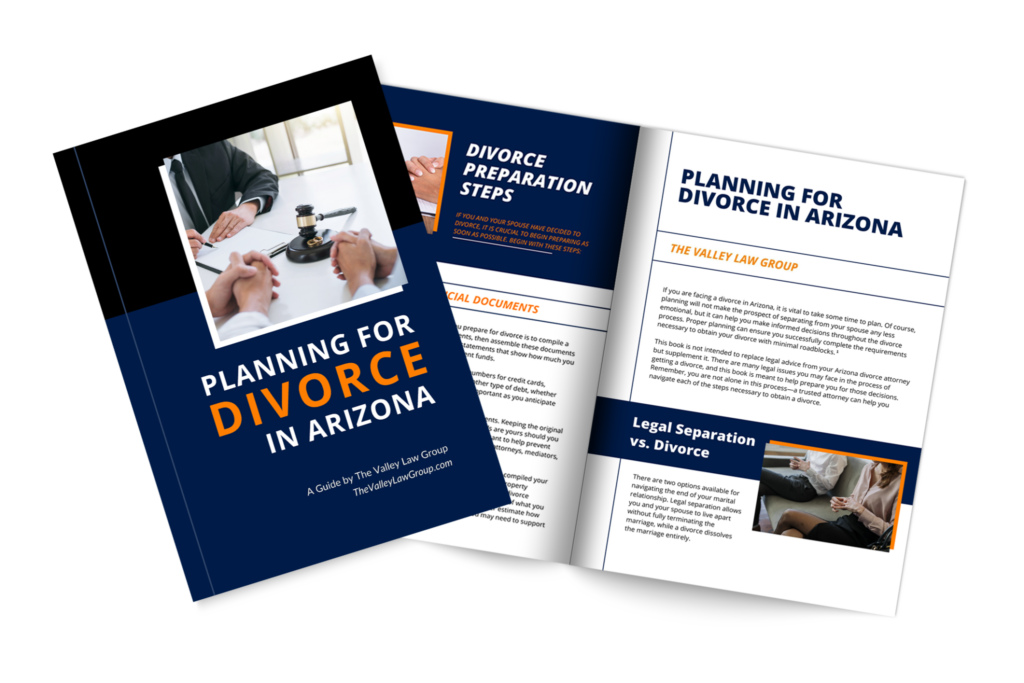Many people do not realize how complicated divorce can be until they experience it firsthand. Divorce typically involves contentious disputes with regard to property distribution, spousal support, child custody, etc. A default divorce in AZ is the easiest way to get divorced, but it also means both parties must be in agreement regarding all terms, which is not always the case.
In fact, depending on your circumstances, your divorce may involve a different set of processes than another couple’s divorce. For example, different couples may benefit from different methods of dispute resolution, and couples with children or high net worths may require longer, more complex divorce proceedings. Below are the many practice areas of divorce law in Arizona offered by The Valley Law Group. In some instances, these practice areas overlap.
Annulment
Annulments in Arizona can be difficult to achieve due to the strict conditions they require. In Arizona, a successful annulment means the marriage becomes null and void – as if it never happened. This unique circumstance requires a Declaratory Judgement from the Arizona Superior Court to void a marriage.
In Arizona, for a marriage to be considered “voidable,” one of the following criteria must be met:
- One of the parties experienced an absence of mental or physical capacity at the time the marriage took place
- There was no valid marriage license at the time of marriage
- The parties are blood-related
- One of the parties was already married to someone else when the marriage took place
- One of the parties was under duress at the time the marriage took place or was fraudulently coerced into marrying
- There was a lack of contractual intent
- The marriage was a proxy marriage
- One party secretly planned to violate the prenuptial agreement
- One party lied about or misrepresented their religion
- One party refused to consummate the marriage
- One or both parties were underage at the time of the marriage
To determine whether your marriage is eligible for an Arizona annulment, contact an experienced annulment attorney at The Valley Law Group.
Learn more about our Annulment Services here
Collaborative Divorce
While divorce is often contentious, it does not need to be the spiteful, drawn-out scene that is so often portrayed in the movies. In fact, it has become common for states to encourage an amicable divorce in order to avoid the animosity, time, and resources that a long and stressful divorce trial can represent. Consequently, a collaborative Arizona divorce enables divorcing couples to work together or collaborate on the terms of their divorce instead of litigating every detail in court and in the public eye.
Collaborative divorce encourages couples to work as a team with their attorneys to make mutual decisions that benefit both parties instead of giving all the decision-making power to a judge. The Valley Law Group has represented and supported many clients in successful collaborative divorces. It can be an easier way for many people to approach divorce.
Learn more about our Collaborative Divorce Services here
Divorce Mediation

Divorce mediation is another contemporary approach to divorce, as it can often be a less combative alternative to the courtroom proceedings of a traditional divorce trial. Couples often opt for divorce mediation as a last resort to avoid litigating one or more issues involved in divorce, such as property division or spousal support. Enlisting the help of a neutral, third-party mediator is often useful in helping couples gain perspective and find common ground to dissolve disagreements.
The Valley Law Group offers divorce mediation services and helps clients work through disputes in a cordial and practical way. Mediation often sets the stage for an amicable post-divorce relationship, as well.
Learn more about our Divorce Mediation Services here
High-Asset Divorce
For married couples considered “high-asset” (with assets totaling $1 million or more), divorcing can present different challenges than for families with average incomes. Because there are more assets to inventory, classify, and divide, there are more considerations to be made, more disputes to be resolved, and more care to be taken. Considerable assets can affect couples while dividing property, considering spousal support, determining parenting time, and evaluating other sensitive areas of divorce.
In addition, some high-asset divorce cases are also high-profile divorce cases. However, the truth is that most people prefer to keep their private affairs involving divorce out of court while pursuing discreet resolutions with as minimal exposure to the public when possible. Therefore, mediation and collaborative divorce are popular choices.
The Valley Law Group is highly skilled in handling successful high-net-worth divorce cases as well as very high-net-worth divorce cases ($5 million or more in assets) and sub-high-net-worth divorce cases (between $100,000 and $1 million in assets).
Learn more about our High-Asset Divorce Services here
Same-Sex Divorce

When it comes to same-sex marriage, many want to know how LGBTQ marriages differ from traditional opposite-sex marriages and thus how same-sex divorce differs from opposite-sex marriage divorce. There can be, in fact, many unique differences. Most variances in a same-sex divorce exist due to a lack of precedent cases involving such sensitive issues as child custody when one parent is the biological parent, but both parents want to be in their child’s life.
Other differences can arise in areas of property division. The lines of separate and community property are often blurred due to the fact that many same-sex couples were living as if they were married for many years prior to the legalization of same-sex marriage. Many couples contributed financially and non-financially to shared assets long before they were officially married. The Valley Law Group is compassionate when it comes to aspects that need to be addressed with more care and consideration in same-sex divorce cases than in opposite-sex divorce cases.
Learn more about our Same-Sex Divorce Services here
Legal Separation
Some married couples in Arizona opt for a legal separation rather than a divorce. While in some cases, a separation is a way to ease into ending a long-term relationship, most couples choose a separation for financial or legal reasons. There are a few benefits of a legal separation that some couples find are more advantageous than getting a divorce, such as protecting their assets, maintaining certain tax benefits, and continuing to share health insurance perks without having to pay penalties for breaking up pension accounts and other financial assets.
It surprises most people to learn that, in many cases, a lower-earning spouse who relies on their partner financially may qualify to receive short-term and even long-term spousal maintenance, which is often known as alimony or spousal support in other states. This occurs more often in marriages that have lasted for many years, though Arizona has strict guidelines for spousal maintenance. The Valley Law Group can assist in deciphering these laws and applying them to your case in the fairest way possible.
Learn more about our Legal Separation Services here
Order Enforcement
When a court-ordered divorce decree, custody order, child support order, or any other type of order is finalized, all parties involved in or named in those orders are expected to obey them. Unfortunately, in many cases, one party fails to fulfill their role in carrying out the order. For example, refusing to pay child support or relinquish a child for visitation as stated in a court order is a violation of a court order.
In these cases, it is necessary to bring the issue to the court’s attention in an effort to reinforce the terms by means of an order enforcement. The Valley Law Group has decades of experience and an excellent track record of successfully handling order enforcement cases.
Learn more about our Order Enforcement Services here
Property & Debt Division

“Is everything split 50-50 in a divorce in Arizona?”
The simple answer is yes.
However, it is essential to note that only property and assets acquired within the timeframe of the marriage are split, and there are many exceptions to this. In addition, most assets are not divided precisely equally, but as close to 50-50 as possible.
Property gained during a marriage is known as community property, which is split evenly between spouses when they divorce. However, inheritances given to one spouse during a marriage are considered the separate property of that spouse. In addition, anything spouses owned separately before marriage is their separate property, which is not split. Another facet of property division that should be noted is that debts are divided as well, which includes credit card debt, mortgage debt, tax debt, and other shared debt accounts.
The Valley Law Group helps individuals work through the discovery of assets and, in some cases, disclosing hidden assets, as well as maintaining fair and lawful property division practices.
Learn more about our Property & Debt Division Services here
Qualified Domestic Relations Orders
If you are over 50 and considering a “gray divorce,” there are many unique emotional and financial implications, including the prospect of dividing retirement savings. When retirement accounts are subject to division amid divorce proceedings in Arizona, it takes a skilled attorney to provide legal support and knowledge regarding a Qualified Domestic Relations Order (QDRO).
These orders can be a convenient means for dividing property, such as retirement accounts, without tax penalties. There are definitive conditions that must be upheld in these cases, though, and a well-versed Arizona attorney like those at The Valley Law Group can make the process easier for both parties.
Learn more about our Qualified Domestic Relations Orders Services here
Spousal Maintenance (Alimony)
After recent provisions to Arizona spousal support laws, family court orders spousal maintenance, or alimony, payments on a strict, case-by-case basis. The court will consider multiple factors in making a decision. For longer marriages in which one spouse has a significantly higher income and the other spouse neglected pursuing a career to support the higher earning spouse’s career, it’s more likely that spousal maintenance will be awarded.
The Valley Law Group has supported clients in countless successful alimony cases. Our lawyers can help you apply the new statutes to your case in an effort to make the law work on your side and the division of property in your case fair and just.
Learn more about our Spousal Maintenance (Alimony) Services here
The Valley Law Group: Your Legal Resource
Visit our divorce resource area for even more information on getting divorced in Arizona, including our free downloadable planner:
Download the Free Divorce Guide
We’ve also created a quiz designed to help you navigate the legal definitions of divorce so you can begin to understand your needs before you speak to an attorney.
The Valley Law Group blog is a comprehensive resource for all your divorce questions. Whether you’re curious about the grounds for divorce in Arizona, steps for preserving your credit score during divorce, or something else, you can turn to our divorce and family law blog to learn the basics.
Remember, divorce does not mark the end of life as you know it. For many, divorce is a beautiful new beginning. The Valley Law Group is here to provide the legal support you need to move forward and past the trials of divorce into a better and more blissful life for you and your family. For compassionate legal guidance during the difficult process of divorce, contact our team today.

Jonathan Roeder, Founder/Director of Marketing of The Valley Law Group, is an Arizona native who has dedicated his life and career to the service of others. After graduating salutatorian of his high school class, Jonathan attended beautiful and prestigious Pepperdine University, where he majored in Political Science. During his tenure at Pepperdine University, his passion for helping others grew after securing a clinical position with a residential treatment center for juveniles with substance addictions. Post-graduation, Jonathan returned to Arizona and served as a residential manager for mentally and physically disabled homes.


